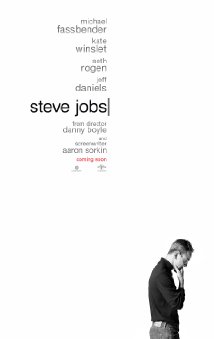
I’ve watched the “Steve Jobs” movie (what a movie!) and I’d like to share a couple of thoughts. The movie is not a substitute for the monumental biography by Walter Isaacson (another book which has been on my bedside table for ever), as the producers have decided to condense Jobs’s life and personality in three of his product-launch events: Macintosh in 1984 (right after the astounding Super Bowl commercial), the NEXT cube in 1988, and the iMac in 1997. Michael Fassbender doesn’t look like Jobs, but he plays his character with great intensity.
The movie doesn’t make a saint out of Jobs. All accounts seem to concur on the fact he was not – and actually the movie emphasizes his insensitivity and his persisting difficulties in empathizing with fellow human beings, including his own daughter Lisa. But this adds to, and doesn’t subtract from, his humanity. Human beings aren’t perfect, and Jobs shows signs of very distinctive talents and virtues: great taste, a genuine passion for the most minute of details, and a remarkable persistence that sometimes looks like single-mindedness.
Very often – more so in Europe than in the United States – entrepreneurs are still not acknowledged for what they are: essential figures in society. We sometimes run into the opposite danger, that of a sort of hero-worship of innovators, forgetting that they build on larger, seldom noticed networks of cooperation. Matt Ridley makes a similar point in his splendid “The Evolution of Everything.” Let’s put it this way. There is a grain of truth in the “you didn’t build that!” argument. But the lesson to be taken is not that the government built it: it is rather that innovation tends to proceed incrementally (as Ridley puts it); it adds discovery to discovery, experiment to experiment. Innovators are indeed indispensable: but the greatest innovator, on a desert island, can’t do much better than Robinson Crusoe.
Now, the Jobs movie makes that rather clear. Jobs himself may not have given proper recognition to people, but he benefited from others. As the fictional Steve Wozniak points out, Jobs was neither a coder nor a professional designer nor an engineer. Jobs responds to that by quoting the paradox of the orchestra conductor. True, the conductor doesn’t play an instrument, which can lead to some frustration, but “he plays the orchestra”.
All in all, I found the movie to be a powerful and truthful illustration of what entrepreneurship is.
Entrepreneurs are not to be idolized as men; they may be pretty mean as individuals (pretty much like university professors, writers, bakers and plumbers), but they provide something valuable to society. This is not the particular application of a certain technical skill: that comes more often from the coder, the designer, the engineer. Their talents lie in coordinating these other skills, making them play all together to produce a beautiful symphony.
Jean-Baptiste Say thought that, among the virtues of the entrepreneur, should be “the constance that leads to overcome the sprinkle of hurdles in our life.” The movie shows that Steve Jobs was not lacking in this department. And it also shows the relentless application of a creative mind. The movie’s message is that he was good both at coordinating other people, and at envisioning products which, in their entirety, escaped the mind of any and each of his collaborators, who were certainly better at writing software or considering hardware.
Jobs is portrayed as dismissive of consumers: he says that “the guy who said that the consumer is always right was certainly a consumer”. That should not, however, obscure the fact that Jobs appears to be far more dismissive of “experts”. Actually, he argues against Wozniak because he doesn’t quite care about “technical” superior knowledge, but thinks of what the consumer will desire. And yes, she will desire a Mac because a Mac is beautiful.
Even supporters of the market process tend to emphasize that it doesn’t have aesthetics, so to say. Waiters are not responsible for their clients’ calorie in-takes. If people want gross TV shows, the market will produce them.
I fear sometimes we tend to forget all too easily how profit-seeking capitalists also produce “beauty.” Jobs is an obvious case in point: he set out to make beautiful objects, to change the life of millions by giving them better instruments but also to share with them his aesthetic tastes. Walt Disney is another name that comes to mind. As “the market” is a metaphor and not a living being, it doesn’t have aesthetic judgment. But beauty and the profit motive shouldn’t be considered incompatible either.

Comments are closed.